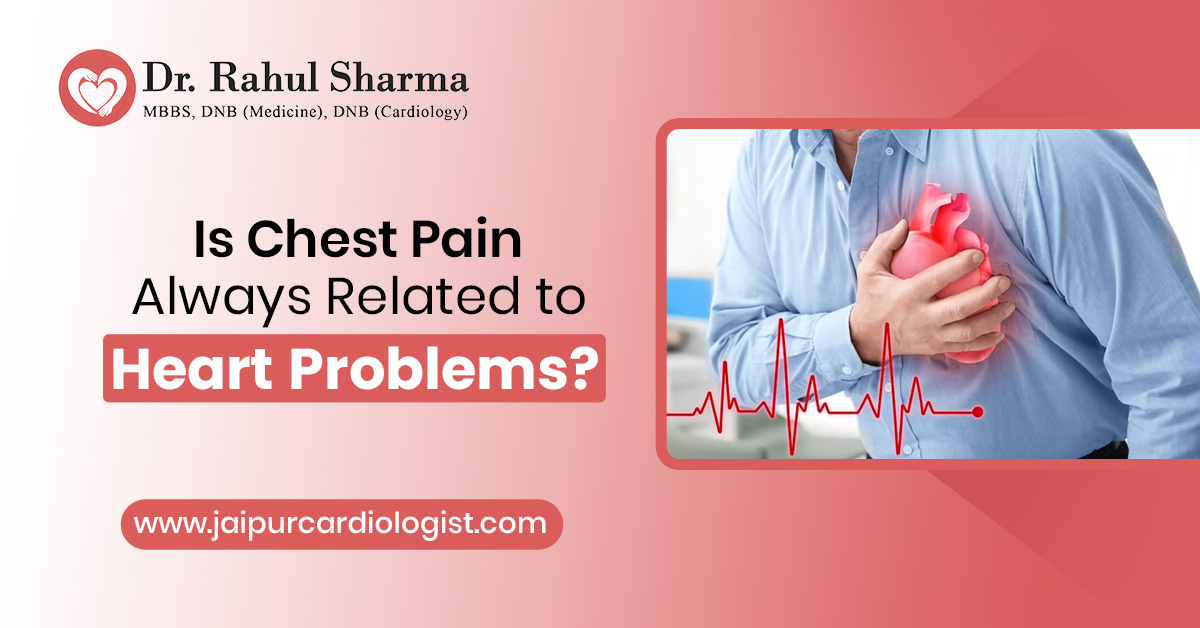
Is Chest Pain Always Related to Heart Problems?
When chest pain strikes, it inevitably causes alarm — and rightly so. Most people immediately wonder:
“Is chest pain related to heart issues?”
The reality is: Sometimes it is, and sometimes it isn’t. Chest pain itself can arise from the heart, lungs, muscles, digestive system, or the mind, for all of which the underlying cause and treatments may differ. That’s why knowing the difference is so important, particularly when your heart may be trying to warn you.
When is chest pain related to heart issues?
Given below are some of the causes of heart disease that lead to chest pain:
Stable Angina: Discomfort in the chest during exercise secondary to decreased blood flow as a result of narrowing of the coronary arteries.
Unstable Angina: Chest pain while resting that signals dangerously low blood supply, a pre-heart attack alarm.
Heart Attack (Myocardial Infarction): Severe chest discomfort caused by a blocked artery resulting in permanent damage to the heart muscle.
Pericarditis: Chest pain that is mild to severe and is in a specific area but may spread to the shoulders, neck, or arms.
Myocarditis: A condition where heart muscles become inflamed, leading to chest pain, fatigue, and irregular heartbeat.
Aortic Dissection: Tearing chest pain caused by a tear in the aorta’s inner layer, which requires emergency surgery.
Coronary Artery Spasm: Chest pain at rest due to partial artery occlusion.
Cardiomyopathy: Chest pain due to weak heart muscles that leads to tiredness, swelling, and difficulty breathing.
Heart Valve Disease: Chest pain during physical activity because narrowed or leaky valves are putting strain on the heart’s ability to pump.
Arrhythmias: Abnormal heart rhythms that can result in chest pain, palpitations, light-headedness, or fainting.
Mitral Valve Prolapse: Intermittent sharp chest pain associated with the wrong mitral valve closing, mostly with palpitations.
Heart Failure with Ischemia: Insufficient blood circulation causes a continuation of chest pain, leading to a failing heart.
How Do You Know If the Chest Pain Is Related to the Heart?
Although chest pain varies for each person, it is a cause for concern if they experience the following chest pain symptoms, which can be signs of a connection between chest pain and heart disease. These are the red flags you should never ignore:
- You may feel your chest compressing or pressing against it.
- The pain spreads to the left arm, jaw, or shoulder, and the back or neck.
- It is accompanied by shortness of breath, nausea, sweating, or dizziness.
- It happens or gets worse during physical activity or emotional stress.
- It doesn’t improve when you rest or gradually becomes worse over time.
Now here’s the other side of that coin: Not all chest pain is due to heart issues. A significant portion of ER visits for chest pain end up being non-cardiac chest pain, serious but not life-threatening.
When chest pain is not heart-related, it is non-cardiac chest pain.
Normal causes of non-cardiac chest pain:
Gastroesophageal Reflux Disease (GERD): A burning to worse pain that occurs with lying down or after meals, with acid reflux being the cause.
Muscle strain or chest wall pain: Pain limited to an area that gets worse when you move or touch it.
Anxiety/Panic Attacks: Severe chest tightness, difficulty breathing, and palpitations, which many times they believe are a heart attack.
Lung Disorders: Pneumonia, pleuritis, and pulmonary embolism are conditions that can be mistaken for heart pain and may require immediate medical treatment.
Esophageal Spasms: Sudden chest pain that may feel like a heart attack. Regurgitation, where food or liquid flows back up into the throat, may also occur.
These are various types of non-cardiac chest pain, and even though they are not symptomatic of heart disease, they still should get the appropriate evaluation and care.
How Can a Heart Specialist in Jaipur Assist?
A real cardiologist doesn’t just treat but investigates the cause. During your appointment, you may receive:
- ECG (Electrocardiogram): Heart rhythm check and damage detection
- 2D Echo or Ultrasound: To test heart function and valve movements
- Stress Test / TMT: To check the heart condition under stress.
- Coronary Angiography: A detailed image of blood flow in the arteries
- Blood tests: To look for enzymes that lead to a heart attack.
Final words
So we cannot say that chest pain is related to heart disease. But also, we cannot ignore it. That is why it is very important to make an appointment with the heart specialist in Jaipur to ensure your heart and health are both in safe hands.



